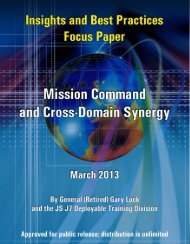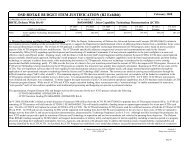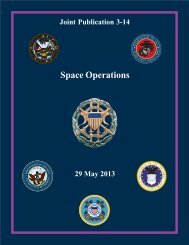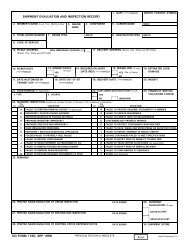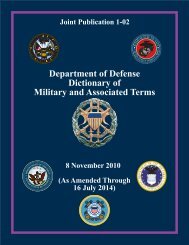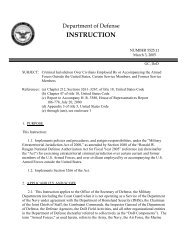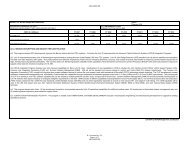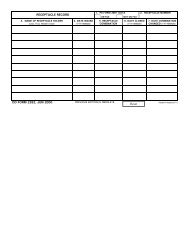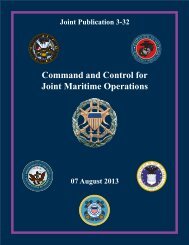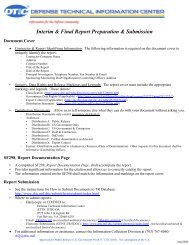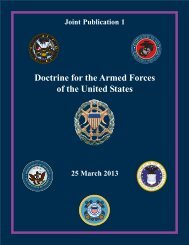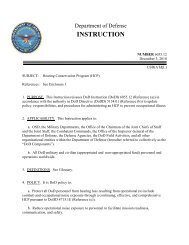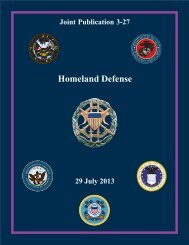JP 3-16, Multinational Operations - Defense Technical Information ...
JP 3-16, Multinational Operations - Defense Technical Information ...
JP 3-16, Multinational Operations - Defense Technical Information ...
Create successful ePaper yourself
Turn your PDF publications into a flip-book with our unique Google optimized e-Paper software.
Chapter III<br />
(a) Normally, such issues will be formally resolved with HNs through the<br />
development of appropriate technical agreements to augment existing or recently developed<br />
status-of-forces agreements (SOFAs) or status of mission agreements. These agreements,<br />
negotiated between the HN and the sponsoring organization on behalf of the participating<br />
countries, establish the detailed legal status of MNFs.<br />
(b) Authority to negotiate a SOFA is held at the national level. For US forces,<br />
some specified portions of that authority have been delegated to the Joint Staff and CCDRs.<br />
Neither the MNFC nor the staff has such authority without specific approval or delegation<br />
from higher authority. Before any negotiations or agreement with another nation, the SJA or<br />
appropriate legal authorities should be consulted. US forces remain subject to the Uniform<br />
Code of Military Justice, which will be administered by the appropriate US commander.<br />
(2) The commander may also create structures such as committees to address<br />
sovereignty issues. These committees may be chaired by military or nonmilitary<br />
representatives of the HN to facilitate cooperation and build trust. These organizations could<br />
facilitate operations by reducing sensitivities and misunderstandings and removing<br />
impediments. In many cases, SC organizations, NGOs, and IGOs resident in the HN can<br />
help establish good will with the HN. In some cases, these organizations may also be called<br />
upon to assist in the conduct of operations or in establishing a congenial relationship in the<br />
HN.<br />
5. Legal<br />
a. Commanders must ensure that MNTF forces comply with applicable national and<br />
international laws during the conduct of all military operations. Participating nations should<br />
provide commanders with access to legal advice throughout the operation to facilitate a<br />
comprehensive understanding of any national differences. In operations under the authority<br />
of NATO, relevant alliance documents will be applicable.<br />
b. US forces will comply with the law of war (also referred to as the law of armed<br />
conflict [LOAC]) during all armed conflicts and in all other military operations.<br />
Additionally, US forces will be trained in the law of war. US forces will report all possible,<br />
suspected, or alleged violations of the law of war (for which there is credible information or<br />
conduct during military operations that would constitute a violation of the law of war if it<br />
occurred during an armed conflict) through command channels.<br />
Refer to DODD 2311.01E, DOD Law of War Program, and CJCSI 5810.01D,<br />
Implementation of the DOD Law of War Program.<br />
c. International Agreements. The Armed Forces of the United States are committed<br />
to conducting joint and multinational operations according to the applicable provisions of the<br />
LOAC, including those of The Hague and Geneva Conventions. International agreements<br />
are the primary source of rules of international law applicable to US, multinational, and HN<br />
forces. The most comprehensive are SOFAs; however, these may be modified or become<br />
inapplicable in time of armed conflict. They prescribe most of the reciprocal rights, powers,<br />
duties, privileges, and immunities of the US forces to include DOD civilians and contractor<br />
III-8 <strong>JP</strong> 3-<strong>16</strong>



